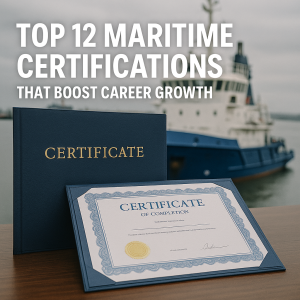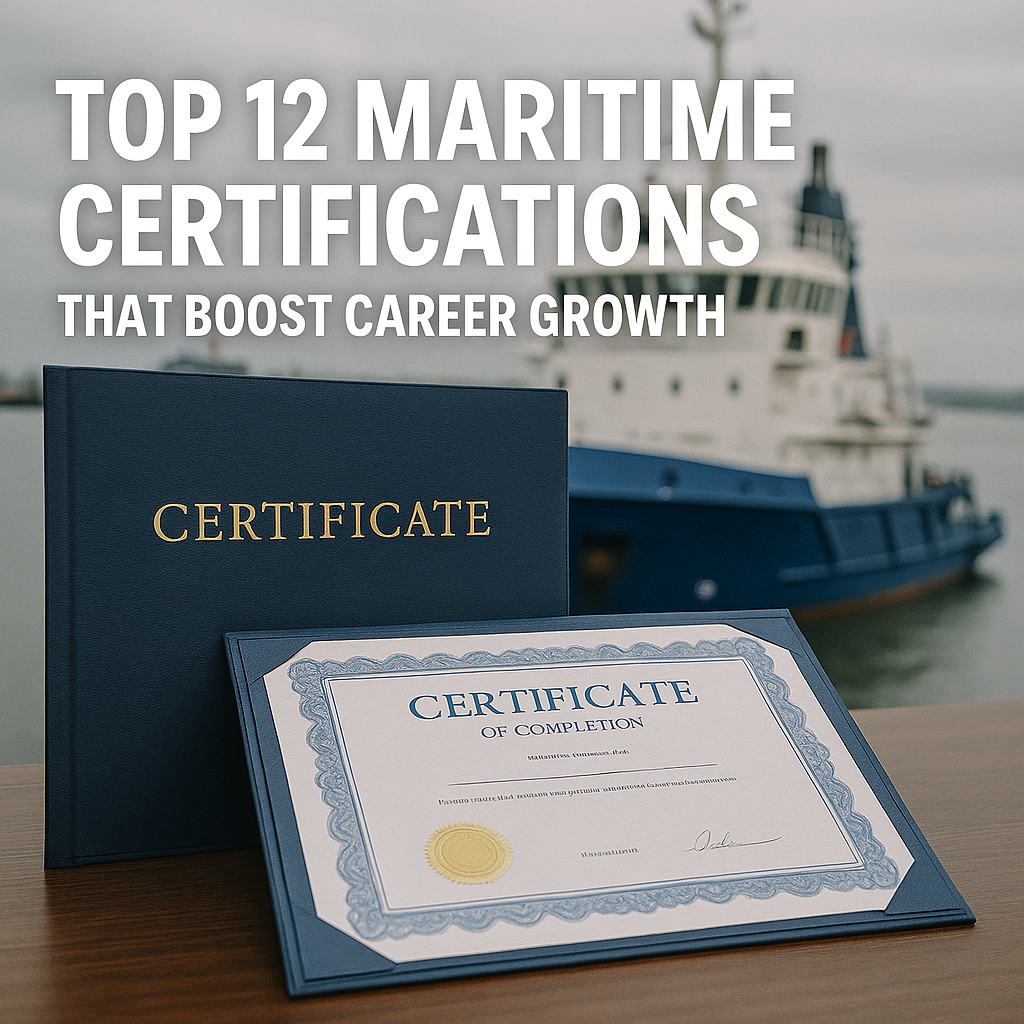
Want to accelerate your maritime career? Explore the top 12 certifications that open doors to better contracts, promotions, and global opportunities. From STCW to advanced safety and management training, this guide explains what matters most for seafarers and maritime professionals.
Why Certifications Matter More Than Ever 🚢
The maritime industry moves more than 80% of global trade by volume (UNCTAD, 2023). Behind every ship at sea are seafarers whose qualifications are constantly scrutinised by flag states, port authorities, shipowners, and insurers. In such a high-risk and globally connected profession, certifications are not just pieces of paper—they are passports to better contracts, higher salaries, and long-term career growth.
For cadets, the right certification can mean landing that all-important first contract. For experienced officers, additional qualifications may unlock management roles ashore. In an era of rapid change—where decarbonisation, digitalisation, and safety remain top priorities—employers increasingly seek candidates with advanced training.
This article highlights the top 12 maritime certifications that significantly boost career growth. It explains their value, entry requirements, and how they fit into real-world job progression.
Why Maritime Certifications Are Essential in Modern Shipping
- Regulatory compliance – International conventions like STCW, SOLAS, and MARPOL require mandatory training. Without the right certifications, seafarers cannot legally serve.
- Career competitiveness – Shipowners often shortlist candidates based on certification levels. A well-qualified officer stands out among hundreds of applicants.
- Safety culture – Training in firefighting, survival, and crisis management directly reduces accidents. EMSA (2023) attributes over 75% of maritime accidents to human factors, many preventable through training.
- Adaptation to change – Emerging fuels (LNG, methanol, ammonia) and smart ship systems require new qualifications.
–
The Top 12 Maritime Certifications for Career Growth
1. Standards of Training, Certification, and Watchkeeping (STCW) Basic Safety Training
This is the foundation of every seafaring career. Covering fire prevention, personal survival techniques, first aid, and personal safety, STCW Basic is mandatory under IMO conventions.
Career Value: Without it, you cannot step on board a commercial vessel. It proves you understand basic survival and emergency response.
2. Certificate of Competency (CoC) – Officer Ranks
Issued by national maritime authorities (e.g., UK MCA, India’s DG Shipping, USCG), the CoC certifies competence to serve as officer of the watch, second engineer, chief mate, or captain.
Career Value: The CoC is a ladder. Each level (OOW → Second → Chief → Master) corresponds with seniority, responsibility, and salary increases.
3. Global Maritime Distress and Safety System (GMDSS) Radio Operator Certificate
This certifies knowledge of satellite and radio communications essential for distress calls and routine reporting.
Career Value: Required for deck officers. Also opens career options in VTS centres, coastguard operations, and offshore industries.
4. Tanker Training Endorsements (Oil, Chemical, Gas)
STCW requires specialised training for working on oil, chemical, or LNG carriers.
Career Value: Tanker jobs are among the highest-paying at sea. An LNG tanker officer may earn 20–30% more than counterparts on bulk carriers (Clarksons Research, 2022).
5. Advanced Firefighting
A step beyond basic safety, this training equips officers to lead firefighting teams and manage onboard emergencies.
Career Value: Essential for promotion. Demonstrates leadership in crisis—highly valued by classification societies and insurers.
6. Medical First Aid and Medical Care Certifications
Seafarers often serve far from shore hospitals. IMO Model Courses mandate training in advanced first aid and medical care at sea.
Career Value: Makes candidates more employable, particularly on passenger ships and offshore vessels where medical emergencies are more frequent.
7. Bridge Resource Management (BRM) / Engine Room Resource Management (ERM)
Modeled after aviation’s Crew Resource Management, BRM and ERM focus on teamwork, situational awareness, and decision-making.
Career Value: Increasingly demanded by PSC authorities and quality-focused owners. Enhances employability for officer ranks.
8. Maritime Security Training – ISPS Code
The International Ship and Port Facility Security (ISPS) Code requires seafarers to be trained in security awareness and duties. Higher levels include Ship Security Officer (SSO) certification.
Career Value: Particularly relevant in piracy-prone zones like the Gulf of Guinea. Also adds weight for shore-based port security roles.
9. Polar Code Certification
For officers working in Arctic or Antarctic routes, IMO’s Polar Code requires specific training in ice navigation, cold weather survival, and polar safety.
Career Value: A niche qualification that opens rare but prestigious opportunities, especially as Arctic routes gain importance due to climate change.
10. Dynamic Positioning (DP) Operator Certificate
Critical for offshore sectors (oil, gas, wind). Trains officers to operate DP systems keeping vessels in exact positions without anchoring.
Career Value: Highly lucrative. DP operators in offshore wind or subsea projects command premium salaries.
11. Maritime Leadership and Management Training
Increasingly, companies require officers to prove not just technical skills but also leadership. IMO Model Course 1.39 (Leadership and Teamwork) is widely adopted.
Career Value: Prepares officers for command roles. Demonstrates readiness for managing diverse crews.
12. LNG Fuel Handling & Alternative Fuels Certification
With decarbonisation policies accelerating, certifications in handling LNG, methanol, and ammonia are emerging. Training providers like DNV, Lloyd’s Register, and Wärtsilä Academy offer recognised courses.
Career Value: Future-proofs careers. Employers urgently need officers with competence in low-carbon fuels, making this certification a differentiator.
–
Real-World Impact: Stories from the Sea
-
A Filipino Chief Mate: After completing BRM and advanced tanker endorsements, he moved from bulk carriers to LNG tankers, doubling his salary within three years.
-
A Greek Engineer: Completing a DP Operator course transitioned him into the offshore wind sector, where day rates reached over $600.
-
A Cadet in India: Obtaining GMDSS certification before his first contract gave him a competitive edge with crewing agencies.
These examples highlight that certifications are not just academic—they directly change career paths.
Challenges and Solutions in Maritime Certification
-
Cost Barriers – Courses can be expensive. Solutions include employer sponsorship or scholarships from associations like ITF Seafarers’ Trust.
-
Time Off for Training – Seafarers on tight contracts struggle to attend courses. Online/hybrid training models are expanding, accelerated by COVID-19.
-
Quality Variations – Not all training centres meet IMO standards. Always choose providers accredited by flag states or classification societies.
The Future of Maritime Certifications
Expect growth in:
-
Green shipping qualifications – linked to IMO’s 2050 GHG strategy.
-
Cybersecurity training – as ships become increasingly digital.
-
Wellbeing & resilience training – addressing seafarer mental health, now part of many company policies.
According to BIMCO & ICS Manpower Report (2023), the industry will need 90,000 additional officers by 2030. Certifications are the currency that will decide who secures these roles.
Frequently Asked Questions
Do I need all 12 certifications to succeed?
No. Start with mandatory STCW and CoC, then add specialised courses based on your career path (e.g., tankers, offshore, polar).
Which certification pays the most?
Tanker endorsements and DP Operator certificates usually lead to the highest salaries.
Are online maritime certifications accepted?
Only if approved by flag states or recognised institutions (e.g., DNV, MCA, USCG). Always verify before enrolling.
How long do certifications last?
Most (firefighting, medical, security) must be renewed every 5 years. CoCs often require revalidation linked to sea service.
Can shore-based professionals benefit?
Yes. ISPS, leadership, and LNG fuel handling certifications are valuable for port managers, surveyors, and regulators.
Conclusion: Plotting Your Course to Career Growth 🌍
In a world where ships are bigger, routes are riskier, and technology evolves rapidly, maritime professionals cannot rely on experience alone. Certifications are the compass and engine of career growth—opening access to better contracts, promotions, and opportunities ashore.
Whether you are a cadet stepping on board for the first time or a senior officer aiming for command, the top 12 certifications outlined here represent stepping stones in your professional voyage. Invest in them wisely, and the sea will reward you with a career that spans continents and generations.


THANKS, a nice article !